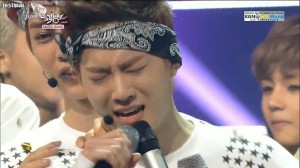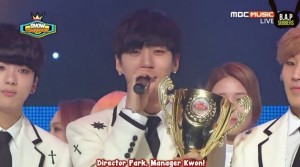First they came for Sistar and I didn’t speak out because I’m not a Star1.
Then they came for EXO and I didn’t speak out because I’m not an Exotic.
Then they came for 4Minute and I didn’t speak out because I’m not a 4NIA.
Then they came for B1A4 and I didn’t speak out because I’m not a BANA.
Then they came for Soyu and Junggigo and now it’s time to speak up.
It’s clear that sajaegi, or chart manipulation, isn’t going to go away any time soon. Any artist to see a sudden rise in the charts or to win their first music show will likely come under scrutiny for manipulating sales, oftentimes being accused of purchasing their own music in bulk or utilizing methods of mass streaming to increase their perceived popularity and chart rankings. What are your thoughts on this practice? Do you believe these are legitimate accusations or is this a witch hunt spiraling out of control?
 Lindsay: I have mixed feelings on this issue because, on the one hand, K-pop is an industry rife with corruption and marketing politics so I can easily see an entertainment company doing something shady to get their group more sales; but on the other hand, I also know how K-pop fans are about their biases so it is hard for me to dismiss the likelihood that at least some of the sajaegi claims are nothing more than pride-hurt fandoms refusing to believe anyone could beat their favorite group on a music show. Basically, it could go either way.
Lindsay: I have mixed feelings on this issue because, on the one hand, K-pop is an industry rife with corruption and marketing politics so I can easily see an entertainment company doing something shady to get their group more sales; but on the other hand, I also know how K-pop fans are about their biases so it is hard for me to dismiss the likelihood that at least some of the sajaegi claims are nothing more than pride-hurt fandoms refusing to believe anyone could beat their favorite group on a music show. Basically, it could go either way.
Obviously, the practice wouldn’t have a name if it hadn’t legitimately happened at least a few times so we can’t deny its existence, but recently it has felt more and more like fans are using the practice as a way to hurt the reputation of anyone successful. Or, now that it has become a “thing,” it could just be one big conspiracy in which the entertainment companies are using the fact that no one is going to take screaming fangirls seriously to actually commit sajaegi because if someone calls them on out it, they’ll just say, “Those silly fans, they’re just upset their oppas lost.”
 Mark: I agree that it is a little bit of both: illegitimate practices combined with fandom accusations. In a business sense, it makes sense that agencies would undergo such a practice if it equates to an overall net gain. Given that idols make most of their money from live performances, endorsements, and other activities outside of actually selling music, and that music sales is the currency which secures them these opportunities, the low cost of buying back their artists’ music may very much be offset by the positive gains they acquire from all the new opportunities which spring up due to their artists’ seemingly increased popularity.
Mark: I agree that it is a little bit of both: illegitimate practices combined with fandom accusations. In a business sense, it makes sense that agencies would undergo such a practice if it equates to an overall net gain. Given that idols make most of their money from live performances, endorsements, and other activities outside of actually selling music, and that music sales is the currency which secures them these opportunities, the low cost of buying back their artists’ music may very much be offset by the positive gains they acquire from all the new opportunities which spring up due to their artists’ seemingly increased popularity.
The way I see it, uncovering sajaegi is very much like diving into the murky waters of athletes using performance enhancing drugs in professional sports. Whenever there is a crack in the system which brings forth information on an unfair advantage for an artists or an athlete, there will always be finger pointing and accusations from detractors and opponents. Even though it speaks to a much larger issue of corruption and greed in the industry, there’s always going to be a scapegoat who has to take the fall. In the case of baseball, it was Barry Bonds. In cycling, it was Lance Armstrong. Who will it be for K-pop?
 Laverne: You both make great points and I definitely think sajaegi is a combination of both. On top of that, it reeks of desperation. Even with great songs, idols still don’t win #1 and I think the pressure of getting publicity and making money leads these companies to commit sajaegi. How widespread sajaegi is, I don’t know. I’m an optimist so I’d like to think it isn’t all that common but the realist in me says otherwise. At the end of the day, there are just too many idol groups competing for a limited number of music show wins and it’s no wonder companies end up going to extremes.
Laverne: You both make great points and I definitely think sajaegi is a combination of both. On top of that, it reeks of desperation. Even with great songs, idols still don’t win #1 and I think the pressure of getting publicity and making money leads these companies to commit sajaegi. How widespread sajaegi is, I don’t know. I’m an optimist so I’d like to think it isn’t all that common but the realist in me says otherwise. At the end of the day, there are just too many idol groups competing for a limited number of music show wins and it’s no wonder companies end up going to extremes.
Which leads me to the question: can companies get in trouble legally for sajaegi?
 Ambika: I think it’s sometimes hard to differentiate sajaegi from a group just getting popular. And especially on our side, away from cultural representations of how popular a song is, it’s hard to get a good picture of which songs are actually well known. But more than that, even if there are accusations, there seem to be no repercussions aside from public doubt. It’s been so long since we started hearing rumors about Starship Entertainment or Brave Brothers manipulating the charts, but aside from the formation of a coalition that doesn’t seem to be doing anything, nothing happens.
Ambika: I think it’s sometimes hard to differentiate sajaegi from a group just getting popular. And especially on our side, away from cultural representations of how popular a song is, it’s hard to get a good picture of which songs are actually well known. But more than that, even if there are accusations, there seem to be no repercussions aside from public doubt. It’s been so long since we started hearing rumors about Starship Entertainment or Brave Brothers manipulating the charts, but aside from the formation of a coalition that doesn’t seem to be doing anything, nothing happens.
Since it’s either the company buying back music, or it most likely involves an exchange of money with one of the music charts, this makes it undesirable for any party to actually cop to the deal. With more of the music shows giving heavier weight to digital sales and streaming, it only makes sense to focus more efforts on domestic digital sales. Those physical bulk buys still look pretty great, but they aren’t good enough alone for a win anymore. In summary, I agree that it’s a mix of fan accusations and some shady happenings, but it’s hard to clearly distinguish between the two.
 Mark: I think the issue really boils down to: is sajaegi helping or hurting the industry? And from the number of seemingly new acts getting their deserved opportunities at the spotlight, I’m going to say that it’s actually helping. There are so many awards show trophies to go around nowadays so it’s great to see up and coming artists gain recognition for their work with a hard earned and emotional first win on a music show. So what if it comes at the cost of a well established artist being slighted a trophy here and there? At this point, does TVXQ really care about music show wins? On the other hand, acts like B1A4 and AOA get their moment to shine, and whether they accomplished it with or without sajaegi is almost besides the point.
Mark: I think the issue really boils down to: is sajaegi helping or hurting the industry? And from the number of seemingly new acts getting their deserved opportunities at the spotlight, I’m going to say that it’s actually helping. There are so many awards show trophies to go around nowadays so it’s great to see up and coming artists gain recognition for their work with a hard earned and emotional first win on a music show. So what if it comes at the cost of a well established artist being slighted a trophy here and there? At this point, does TVXQ really care about music show wins? On the other hand, acts like B1A4 and AOA get their moment to shine, and whether they accomplished it with or without sajaegi is almost besides the point.
 In an industry where big agencies (namely, the Big 3) dictate success and longevity, sajaegi helps level out the playing field for smaller companies. It’s not like these artists aren’t working extremely hard to get to where they’re at. In fact, it can be argued that artists outside of the Big 3 have to work even harder to gain recognition due to their constant promotions to stay relevant. I mean, does B.A.P not deserve trophies for all their hard work from promoting what is already a voluminous discography? On the other hand, EXO comes out with a song here and there and are guaranteed widespread recognition due to their label. Is it fair to say that B.A.P is any less deserving of EXO?
In an industry where big agencies (namely, the Big 3) dictate success and longevity, sajaegi helps level out the playing field for smaller companies. It’s not like these artists aren’t working extremely hard to get to where they’re at. In fact, it can be argued that artists outside of the Big 3 have to work even harder to gain recognition due to their constant promotions to stay relevant. I mean, does B.A.P not deserve trophies for all their hard work from promoting what is already a voluminous discography? On the other hand, EXO comes out with a song here and there and are guaranteed widespread recognition due to their label. Is it fair to say that B.A.P is any less deserving of EXO?
If it takes a bit of sajaegi to gain hard working artists from outside of the Big 3 the recognition that they deserve, then where’s the harm in that?
 Kelsey: I would agree with Mark. I used to be very skeptical about how much music show awards really matter, but one thing that I’ve enjoyed about 2014 thus far is gold being well distributed between a lot of new groups, some that I’d probably never expect to win against acts from bigger companies. Sajaegi, while an inequitable practice, is bringing more equality to music shows than there would be if it didn’t exist.
Kelsey: I would agree with Mark. I used to be very skeptical about how much music show awards really matter, but one thing that I’ve enjoyed about 2014 thus far is gold being well distributed between a lot of new groups, some that I’d probably never expect to win against acts from bigger companies. Sajaegi, while an inequitable practice, is bringing more equality to music shows than there would be if it didn’t exist.
I can’t imagine that there will actually be some probe into which companies and artists have been benefiting from sajaegi. I’d suspect that the majority of companies have done a shady deed here or there if it meant additional promotion for their groups. It’s in no one’s best interest to blow the lid on music show corruption, and it’s actually in K-pop fans’ best interest if they’re looking to find new idol groups to listen to. To me, it seems silly to use an ethics-based complaint about allegedly “lower-tier” idols winning awards they may not deserve when there are some groups that are banned from even performing on music shows at all. In defense of sajaegi, the entire system has never been all that fair to begin with.
(Images via Mnet, SBS, KBS, MBC, MTVK, Brave Entertainment)



